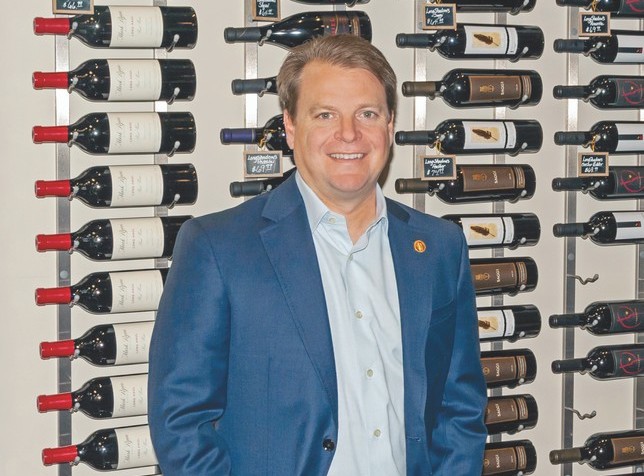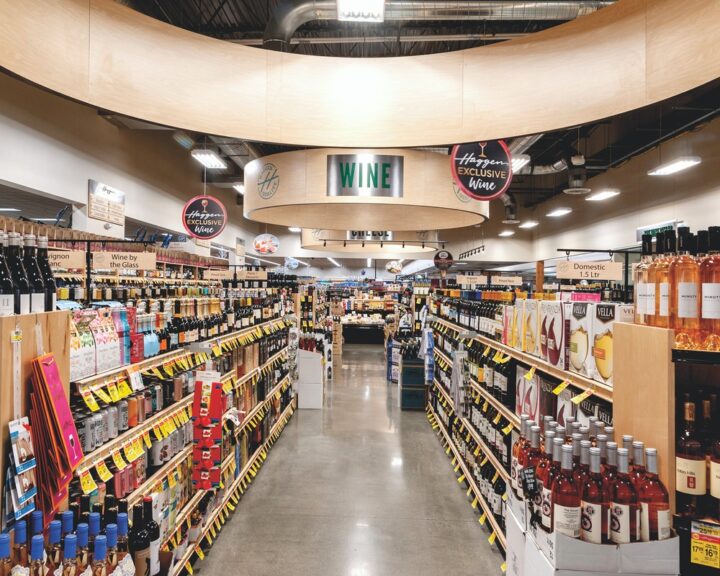
Despite claiming ownership for guiding and managing the beverage alcohol category at one of the largest retailers in the country, Curtis Mann takes an independent wine merchant approach to customer service. “Customers are looking to us to be the experts in wine and spirits,” says Mann, who serves as group vice president of alcohol at Albertsons Cos. “We need to have the experts at every level—from the store floor to the division buyers to senior leadership.”
Mann’s commitment to knowledgeable service at the Boise, Idaho-based grocery giant is exemplified by its beverage steward program; a recent partnership with the Napa Valley Wine Academy to further educate staff; and frequent in-store and virtual wine, spirits, and beer tastings. A master of wine himself, Mann believes the company’s focus on staff and training will further build trust and loyalty among Albertsons’ millions of customers. “It’s one thing for me to know a lot about wine, but the people who are really selling it—our division managers and beverage stewards—are dealing directly with the customers,” he says. “Our combination of passion and education is what makes us different.” For his dedication to raising the bar in beverage alcohol customer service at thousands of stores around the country, Curtis Mann has been named the 2022 Market Watch Leaders “Retailer of the Year.”

Mega Player
Operating nearly 2,300 retail stores in 34 states and Washington, D.C., Albertsons Cos. is comprised of food and drug stores doing business under the Albertsons, Safeway, Vons, Jewel-Osco, Shaw’s, Randalls, and Haggen banners, among others. For fiscal 2021, the group reported sales revenue of $71.9 billion.
While beverage alcohol sales aren’t broken out, the category clearly is important, and seen as a key driver of future growth. Beer is sold in about 2,000 of the company’s stores, while wine is available in 1,800 locations, and spirits are sold in some 1,200 units. According to Mann, “beer and wine dollar sales are pretty even, and spirits is almost equivalent, even though they’re sold in far fewer stores.” At venues where all three beverage alcohol types are sold, beverage alcohol comprises about 10% of total store sales.
Like so many other retailers, sales and store traffic at Albertsons surged during the Covid-19 pandemic, and beverage alcohol was a big beneficiary. “People were looking to buy food and wine at the same place and knew they could come to Albertsons for fine wine,” Mann says of the shopping patterns during 2020 and 2021. Even this year, with the return of on-premise dining, “we’re still benefiting from people cooking at home,” he notes. “Our business continues to perform well.”
Originally named a Market Watch Leader in 2018—when he served as director of wine, beer, spirits, and beverage at California’s Raley’s Family of Fine Stores—Mann joined Albertsons in 2020. He earned his master of wine distinction two years ago and is currently one of only 400 masters of wine in the world. Prior to his retail career, Mann worked in the supplier tier, including at Trinchero Family Estates, and was also director of wine and spirits insights at Information Resources Inc. At Albertsons, Mann oversees “big picture strategy” for beverage alcohol, he explains, focusing on “what the future of alcohol looks like and what it will look like for our business.” He says that requires innovative thinking.
“As we see our customers premiumize, and as the nature of grocery stores evolve, we’re considering how we compete online, against bottle shops, and versus the on-premise,” Mann explains. As leader of Albertsons’ national beverage alcohol team, Mann is also involved in projects pertaining to the company’s private label and semi-exclusive label program. Product buying decisions are made locally by 12 different divisions around the country, with “influence from the national team,” he says. “We support the divisions in building out programs and helping them build the customer relationship. My focus is on developing that customer for life.”
During his relatively short tenure with the company so far, Mann has already been influential. “Since joining Albertsons, Curtis has made innumerable contributions to our wine and spirits department and has helped transform our stores into wine destinations,” says executive vice president and chief merchandising officer Jennifer Saenz. “His mastery and passion for the craft are demonstrated daily in his role and underscore his team’s commitment to curating high-quality offerings for our customers.” Last year, Mann received the Institute of Masters of Wine’s Taransaud Tonnellerie award for his deep understanding of the production and handling of wine, the first U.S.based retail executive to be so honored.

Destination Category
While department layout and selection vary widely depending on the market, the store banner, and legalities, Mann notes that Albertsons is dedicating more space to wine, beer, and spirits as stores are remodeled. “It’s a destination category for us,” he says, noting that the company is increasing its emphasis on premium offerings. Some in-store features include wine cellars, Borgen temperature-controlled wine cases, lock cases for high-end spirits, tasting bars for sampling, and even a few in-store wine and spirits bars for on-site consumption.
Wine selections typically range from 500-3,000 SKUs, priced from about $4 a 375-ml. can of the company’s own label Outspoken Pinot Noir to $4,000 a 750-ml. of Château Pétrus. Top-selling wines include the 2019 Josh Cabernet Sauvignon ($13 a 750-ml. at the Meridian, Idaho Albertsons), LaMarca Prosecco ($17), and the 2020 Kendall-Jackson Vintners Reserve Chardonnay ($15). While domestic wines are in demand, imports—particularly those priced between $15 and $30—are performing best, Mann says. Cabernet Sauvignon and Chardonnay are the best-selling varietals at Albertsons, but Pinot Noir and Sauvignon Blanc are the fastest growing.
The retailer is particularly excited about the progress and continued opportunity that private and semi-private label wines offer the company. Box Wize, a 3-liter offering with four varietals, priced between $18 and $23, is the top-selling private-label boxed wine in the country, Mann says. Other owned wine labels include the 2019 Creamery Chardonnay ($11 a 750-ml.), 2020 O Organics Chardonnay and Cabernet Sauvignon (both $12), and Kalyana ($12-$14), a certified California sustainable wine offered in Pinot Noir, Cabernet Sauvignon, and Chardonnay expressions. Mann is currently pursuing direct imports from Bordeaux and other regions and expanding the selection of “great price-to-value wines” in the $20-$25 range.

Albertsons stores offer between 300 and 700 beer and hard seltzer SKUs, ranging from $7 a 12-pack of 12-ounce cans of Rolling Rock to $23 a 12-pack of 12-ounce bottles of Drake’s Denogginizer Double IPA. Top-selling brands include Bud Light and Coors Light (both $15 a 12-pack of 12-ounce cans), and White Claw and Truly (both $21). “During the pandemic, people went for volume and seemed to back off craft beer,” Mann says. “But now crafts are picking back up. They’re back to growing and stealing share.” Among crafts, he adds that hyper-local labels are performing best. Non-alcoholic brews are also trending, the retailer says, as consumers increasingly substitute alcohol-free beers for higher-abv brews.
Where legal, Albertsons stores stock between 400-1,200 spirits SKUs, ranging from the private label Vitali vodka ($6 a 750-ml. at Safeway in Oakland, California) to $5,000 for the 30-year-old Macallan Fine Oak single malt Scotch. Top-selling spirits include Tito’s vodka ($27 a 1.75-liter in Oakland), Jack Daniel’s Tennessee whiskey ($34), and Crown Royal Canadian whisky ($24 a 750-ml.). Premium spirits are “on f ire” at the chain, Mann says, particularly Tequila, Bourbon, and rye. “People are making a lot of craft cocktails at home,” and Albertsons is benefitting. Ready-to-drink cocktails are also surging, he adds, led by brands like High Noon ($19 an 8-pack of 355-ml. cans at the Meridian, Idaho Albertsons) and Cutwater ($13 a 4-pack of 12-ounce cans).
As with wine, Albertsons is pursuing premium private-label spirits, Mann reveals. In addition to the already available Round Rock vodka ($12 a 750-ml. in Oakland), the chain is working with distilleries to create barrel selections or semi-exclusive labels, he says. “We’re taking our relationships with famous producers and asking them to make something for us that’s just a little different,” Mann says of the collaborations. Indeed, the retailer is optimistic about the potential “to get our customers to explore higher-end spirits,” noting that “craft cocktails and mixing at home is here to stay.”

E-Commerce Surge
Of course, e-commerce sales—including beverage alcohol— at Albertsons stores have surged since the start of the pandemic. “One of the great advantages of being a grocery store is that wine and food can often be delivered together,” Mann says. In addition to delivery provided by individual stores, the company has partnered with Instacart and DoorDash where legal. “We’ve done a good job in expanding the breadth of where we deliver wine, and now we’re focused on the experience,” he adds. Not surprisingly, Mann and his team plan to make wine education a bigger part of the Albertsons’ e-commerce experience. “We’re working so that our customers can have the world of wine at their fingertips,” the retailer says.
Marketing support for Albertsons’ beverage alcohol program is largely through social media platforms, including Pinterest, Facebook, and YouTube. Where legal, individual banners may tie in special drinks offers to loyalty programs. In addition to sampling, in-store merchandising is a common tool to spark impulse sales and guide customers on their beverage education journey. “We see big upticks in both wine and meat when wine is cross-merchandised in the meat department,” Mann reveals. Other cross-merchandising efforts include placing sparkling wine in the floral department and beer in the produce department.

Mann believes that the company’s support in educating team members and customers about beverage alcohol products is a testament to its commitment to the category. Its partnership with the Napa Valley Wine Academy—via a proprietary online certification program for its beverage stewards—is a “large and continuing investment,” he says. He adds that response to the year-old program so far has been “overwhelming.” Moreover, beverage stewards are encouraged to share their knowledge with other store-level employees, such as cheese mongers and butchers. Albertsons’ beverage alcohol division buyers, meanwhile, are enrolled in Wine & Spirits Education Trust courses.
A skilled and knowledgeable staff, led by Mann, will no doubt help steer continued growth of the beverage alcohol category at Albertsons. “Expertise permeates everything we do,” Mann says. “Building that expertise from the national team to the divisions to the stores will create a solid base.” And from that base of knowledge, Albertsons’ shoppers will experience the ultimate in customer service.